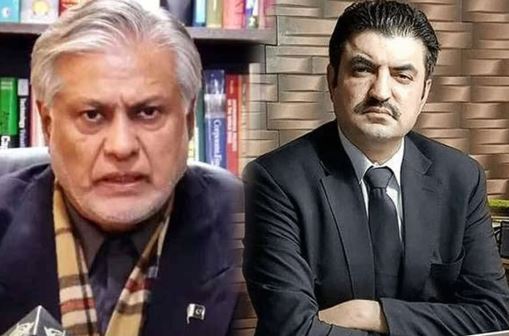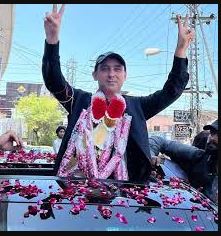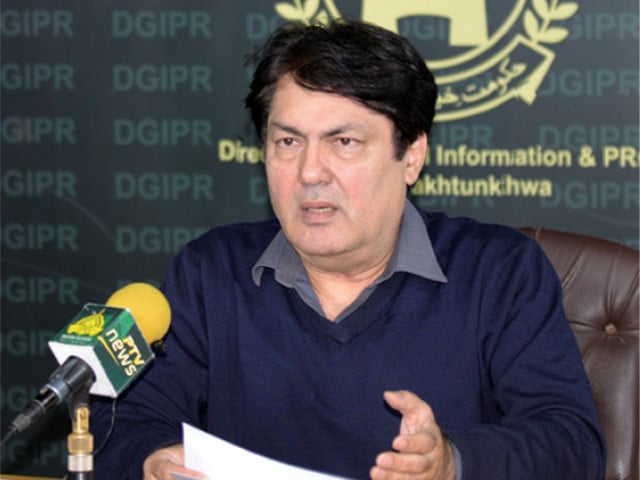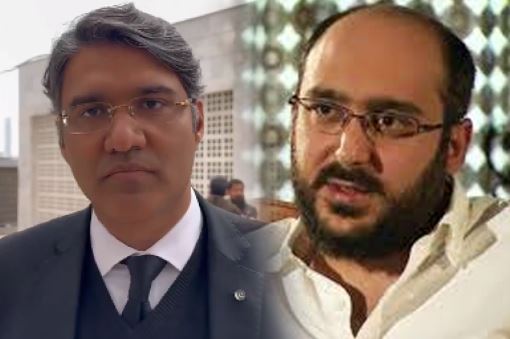- Web Desk
- 6 Hours ago
Why don’t Karachi voters elect women on general seats?
-
- Web Desk
- Jan 10, 2024
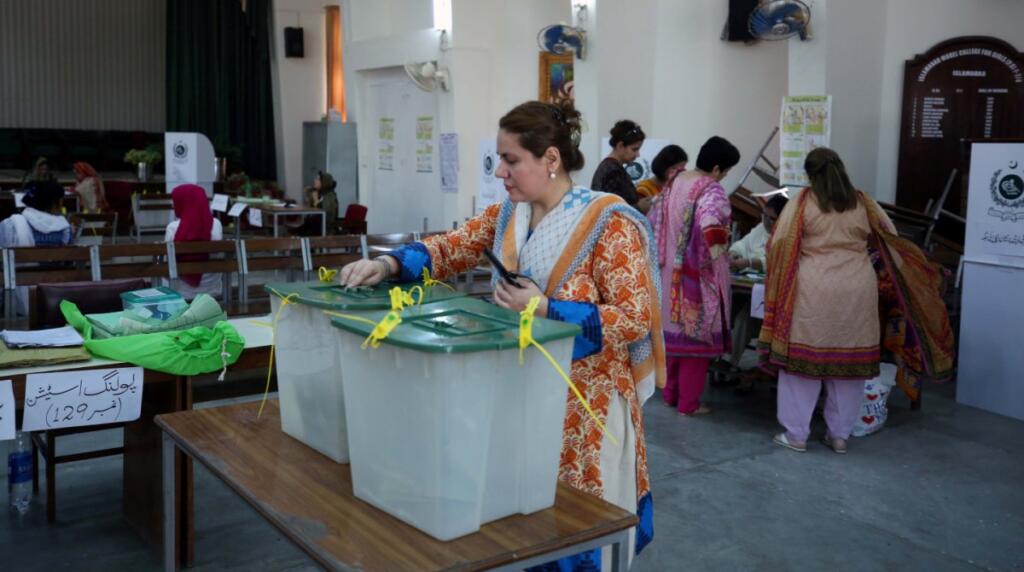
Imran Athar Mangi
It is a sad and tragic fact that no female candidate has ever been elected on a general seat from Karachi. The city that is known for its educated, knowledgeable and intellectual people seems to lose its wisdom when it comes to electing women candidates. This is an important question that needs to be addressed.
The issue of gender discrimination has been a long-standing debate in our country, where women are demanding equal rights as men. The role of women in social development has always been admirable. Women have demonstrated their capabilities in every sphere of life, from domestic to professional. When a leader like Benazir Bhutto entered politics, she became the first woman prime minister of Pakistan. It is this legacy that has kept women active in politics.
However, today, the representation of women in all major and minor political parties of Pakistan is low. Karachi, the capital of Sindh province, is an international city. The city offers opportunities for trade, education and employment that are unmatched by any other city in Pakistan. This is why the people here are second to none in terms of awareness, education, ability and skills. This includes both women and men.
Women from Karachi are actively involved in politics. But despite this, they fail to win general seat elections. Syeda Shehla Raza, a prominent political figure of Karachi, has never been elected to a general seat, even though she has faced many challenges and dangers in her personal and political life.
Syeda Shehla Raza is one of the few politicians who can effectively present her narrative to her opponents. She was elected as a member of the Sindh Assembly from the reserved seat for women in 2018. Before that, she served as the Deputy Speaker of the Sindh Assembly twice, in 2008 and 2013. However, she could never win a general seat.
Shehla Raza, the leader of Pakistan People’s Party, says that she contested the election in 2018 against the PTI founder and former chairman Imran Khan. He did not hold any meeting in this constituency. He is no longer in politics, but she is still among her people in her constituency. She says that men assume that they will get the general seats and women will get the reserved seats. But women have shown their talents in every field. It is up to the party to nominate whoever it wants for the general seat. She says that the party often decides at the last minute that she should contest from this constituency, but she has worked very hard for it and she wants to contest from here in the next elections.
According to her, the party always supports her and being a woman is not an advantage or a disadvantage. It depends on the voters and the constituency which candidate they want to elect. She says that maybe women do not apply for general seats. There are no problems in the elections, just like normal ones.
Khushbakht Shujaat is a well-known name in Pakistan. She has a versatile personality and has excelled in education, Pakistan Television, and politics. She says that women have immense potential that needs to be unleashed. If women are given a chance, they can achieve anything. She says that she requested her party to let her contest on a general seat instead of a reserved seat, and her party supported her.
She says that the voters should consider the personality, past, work and achievements of the candidates. They should also vote based on the ideology of the party, the passion to serve, and the past and future plans of the party. She admits that contesting elections on general seats is a difficult task, as it puts her in direct competition with male candidates. She says that men seem to be more active in elections than women, who have other responsibilities in life. She also says that the parties do not cooperate much in supporting women candidates for general seats.
She says that she belongs to Karachi and the people have always appreciated her work and services. She says that this is why she won the 2008 election by a huge margin. She also says that they boycotted the 2013 election due to rigging, otherwise they would have been unbeatable. She also says that she is the only woman who has been elected as the president of the Arts Council of Pakistan three times, where only intellectuals, writers and talented people vote.
She says that in other parts of Pakistan, women who are unknown and have no party affiliation are winning. But they belong to big families from Punjab and other regions, and they themselves admit that they have never participated in any campaign. She says that they take the lead in every corner meeting and public meeting in Karachi to solve the people’s problems. She says that there is a perception here that women are not as capable as men, but this is not true. She says that for women to win the general seat, their performance, ability and competence are also important.
Women have received support and help from the parties. Khushbakht Shujaat is a senior MQM member who represents the party on every platform. She is the first woman from MQM to contest a general seat election in Karachi. In the 2008 elections, she defeated PPP candidate Mirza Akhtar Baig in NA-250, but she is one of the few women who have ever won a general seat in Karachi’s electoral history.
In the past, whenever MQM participated in the elections, their party posters only displayed the picture of their leader Altaf Hussain and not the candidates. But Khushbakht Shujaat was the only woman of MQM who put her picture on the party poster and placed it in the Arts Council Karachi, which drew both criticism and attention from the people.
Khushbakht Shujaat says that the day we have land reforms and end the feudal and landlord system, the women of this nation will also rise up as they do in the world. She says that the feudal mentality has oppressed our women. She says that since the creation of Pakistan, the same people have been dominating our politics and sitting in the parliament, passing on their power to their heirs. She says that the parliament has become a family affair.
She says women should be grateful to General Pervez Musharraf who introduced reserved seats for them. The reserved seats for women that we have now are not available in many countries of the world. “I think women should be elected by competing for elections in their constituencies. A woman is the best administrator and you will not find any woman’s name in corruption cases. If women get a chance, they should contest elections and win the general seat so that they are answerable to the people.”
Sharmila Farooqui, a leader of Pakistan People’s Party, also hails from Karachi. Even after joining politics, she was given a reserved seat in the last election. But she has never been able to contest the election on a general seat on behalf of her party. She says that she has never applied for a general seat, so how can she get the ticket. This is a problem, women candidates do not succeed here easily, men are given more preference.
Participation of women in elections is a very big deal in our society. For success, one has to meet people, tell them what programs or projects they want to bring after winning, and share the party manifesto. But the women of our society cannot meet many people at once. Corner meetings and public meetings have been the mainstay of Karachi politics. It is very important to socialize with people in the street and neighborhood. A woman candidate does not have enough time or faces some social barriers that prevent her from participating more actively in the process. Because corner meetings in Karachi usually start from 11 pm and go on till late night.
Women voters have the power to decide the outcome of an election. But many women do not vote as much as men, or at all. If all women voted, the turnout could go from 50 to 85 percent.
Many women who work at home or in offices do not vote for different reasons. But they could make any candidate win or lose if they wanted. They could also elect a woman candidate if they wished.
Once, MQM leader Altaf Hussain asked women not to cook on election day. He said men would work and women would vote. This increased the turnout. This also shows why many women cannot join the election campaign.
Tabsum works. She says, “I was not aware when I first voted, but now I know better. We want a candidate who cares for the people and solves their problems. A woman candidate does not win here because people do not accept her.”
Abida works in Ali Bank. She says, “We want to vote for a woman candidate, but there are few of them. We vote as we like, but the parties decide who runs from here.”
Saeed Ghani, the leader of Pakistan People’s Party, says that political parties do not have a tradition of nominating women for general seats. The main reason is the limited role of women in politics. A male candidate of any party interacts with the people of the constituency throughout the year on various occasions, solves their problems, but female candidates cannot do so. This makes the political leadership favor those candidates who have influence in the constituency when giving tickets.
Sadia Javed, the leader of Pakistan People’s Party, says that running for a general seat is not an easy task. Our society still does not accept the status of women in this regard. We make political statements and say that women stand with men. But whenever there is an election, the minimum expense of a candidate is 6 to 7 crores. People spend money on male candidates to win somehow, but this is never the case with women.
Maryam Nawaz tops list of richest women candidates in election race
The second thing to understand is that if women win general seats from other districts of Sindh, they have been affiliated with a political party from generation to generation, in which first their grandfather was in politics, then their father and now they are. Those women win easily. Shazia Atta Murri not only won the general seat but also defeated Pir Pagada. Shahida Rahmani of MQM, Shamim Mumtaz, Shehla Raza of PPP have been contesting the elections from Karachi in the past.
Another problem is that political parties are unsure about which constituency to nominate a woman candidate for. Getting a ticket at once, then you would not have worked hard in this constituency, people don’t know you and if they don’t meet you, then how will they vote for you. The rest of the finance is very important. The candidate who can spend more on the campaign wins, while women are also weak in terms of finance.
Rana Ansar of MQM has been elected the first woman opposition leader of Sindh Assembly. She says that in the past, women have run for the general seat. Women leaving home is still a problem today. Going to the circle and meeting people was an important development. Participating in elections is seen as a disadvantage here due to the attitudes of our society. Women cannot go to corner meetings, nor can they go out at night. We have not yet created an environment in which women can work freely.
A quick look at the 2013 election results shows that the women of the Pakistan Muslim League-N had a remarkable victory in the general seats. Samira Malik got 1,18,108 votes from Khushab constituency NA-69, Ghulam Bibi Bharwana got 87,002 votes from Chiniot constituency NA-88 and Saira Afzal Tarar got 93,013 votes from Hafizabad constituency NA-102. Similarly, PPP’s Dr. Ezra Fazal got 1,11,667 votes from Nawab Shah NA-213, her sister Faryal Talpur got 83,916 votes from Larkana NA-207 and Dr. Fahmida Mirza got 1,10,684 votes from Badin NA-225. These results indicate how impressive the results have been in areas where women have had the freedom to vote.
Senior analyst Nasir Baig Chughtai says that it is a tragedy that no female candidate has been elected to the general seat from Karachi, it is a sad thing. The city which you call the city of educated people, the city of knowledgeable and knowledge-loving people, where that knowledge is wasted in the process of electing women candidates in the election, this is an important question. It is a big surprise that educated, sensible and intelligent women like MQM’s Khush Bakht Shujaat and Shehla Raza of Pakistan People’s Party lose general seats and that too from areas which are areas of educated people, areas of conscious people, areas of sensible people.
Then there is the tragedy that political parties do not encourage women candidates as they should. Why does the question not arise in the minds that why women from areas like Clifton, Federal B Area, Lalu Khet and Lyari are not elected to the general seat but they are not even given tickets for the election. The people of Karachi are responsible for why they cannot make women candidates successful. No matter how much we talk about enlightenment, but actually our reality is a reactionary one. Women must contest elections on general seats but on the basis of merit, on the basis of intelligence and ability. Women candidates from other districts of Sindh can be elected to the general seat, so why not from Karachi?
Senior analyst Mazhar Abbas says that the main reason for women not being elected to the general seat from Karachi is the lack of encouragement from the party. Political parties need to pay attention to this. It is also the fault of women candidates that they do not apply for the general seat. Women themselves also want to come to certain seats. It is the fault of the political party, the campaign and the voters that they do not make them successful and it is a matter of concern that till date no woman has been elected from the general seat in Karachi except Khush Bakht Shujaat.

